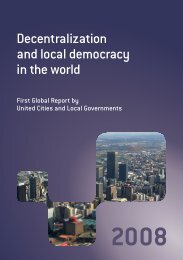Making Cities Resilient Report 2012
Making Cities Resilient Report 2012
Making Cities Resilient Report 2012
You also want an ePaper? Increase the reach of your titles
YUMPU automatically turns print PDFs into web optimized ePapers that Google loves.
for exchange and policy discussion on urban resilience.<br />
ICLEI, together with the WMCCC and the City of Bonn, has<br />
launched a series of annual world congresses on cities and<br />
adaptation to climate change—”<strong>Resilient</strong> <strong>Cities</strong>”—and will<br />
convene the fourth global forum on urban resilience in 2013.<br />
In addition to low carbon and climate neutral cities and<br />
green infrastructure, the goals of ICLEI’s 2010-15 strategic<br />
plan now include “resilient communities.”<br />
United <strong>Cities</strong> and Local Governments (UCLG)<br />
www.cities-localgovernments.org<br />
UCLG is the world’s largest organisation of local and regional<br />
governments, working in 140 countries to represent their<br />
interests, regardless of the size of the communities they<br />
serve, advocating for democratic local self-government, and<br />
promoting their values, objectives and interests, through<br />
cooperation among local governments and within the<br />
wider international community. In the field of resilience<br />
and disaster risk reduction, UCLG is an active participant<br />
in awareness campaigns and information dissemination,<br />
helping its members to put disaster risk reduction on the<br />
local and regional political agenda. UCLG ensures that the<br />
national structures work with local governments on disaster<br />
risk reduction, risk reduction functions and resources and<br />
that local authorities have access to UN and international<br />
risk prevention funds.<br />
academic institutions, and professional and local government<br />
organisations worldwide. By working collaboratively with<br />
its partners, EMI has developed competence in analytical<br />
approaches, strategic planning and problem-solving for<br />
disaster risk reduction, including the model Disaster Risk<br />
Management Master Plan, a tool to guide local authorities<br />
and partner institutions in mainstreaming disaster risk<br />
reduction into governance processes and functions through<br />
a participatory planning process.<br />
United Nations Human Settlements<br />
Programme (UN-Habitat)<br />
www.unhabitat.org<br />
The United Nations Human Settlements Programme (UN-<br />
Habitat is the UN agency for sustainable urban development. It is<br />
mandated to promote socially and environmentally sustainable<br />
towns and cities with the goal of providing adequate shelter<br />
for all. UN-Habitat’s Disaster Management Programme is the<br />
agency focal point for provision of assistance to governments<br />
and local authorities in countries recovering from war or<br />
natural disasters. It also provides technical assistance to help<br />
prevent future crises arising from natural hazards. Working<br />
with partners, including the UNISDR, Red Cross and Red<br />
Crescent movement and others, UN-Habitatcounterparts in<br />
government, civil society and the private sector, aim to ensure<br />
that cities of the future are resilient, well-planned and reduce<br />
their impact on the environment.<br />
CITYNET<br />
www.citynet-ap.org<br />
CITYNET is a regional network of urban stakeholders for<br />
the Asia-Pacific region, including local governments,<br />
development authorities, non-governmental organisations<br />
(NGOs), community-based organisations, research and<br />
training institutes and private companies committed to<br />
helping local governments improve the sustainability of<br />
human settlements. It helps cities and local governments<br />
provide better services to citizens, with a commitment to<br />
capacity building at the local level.<br />
Earthquake and Megacities Initiative (EMI)<br />
www.emi-megacities.org<br />
EMI is an international, not-for-profit scientific organisation<br />
dedicated to the reduction of disaster risk in megacities and<br />
major metropolises. EMI’s mandate is to build capacity in<br />
developing countries by enabling acquisition and application of<br />
scientific knowledge in both policy and practice to strengthen<br />
urban earthquake preparedness and mitigation. EMI draws<br />
strength from its network of partner cities, research and<br />
<strong>Making</strong> <strong>Cities</strong> <strong>Resilient</strong> <strong>Report</strong> <strong>2012</strong> | 81

















